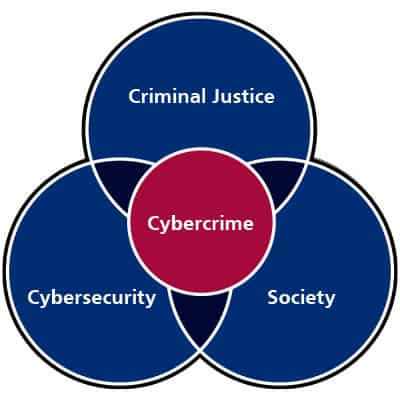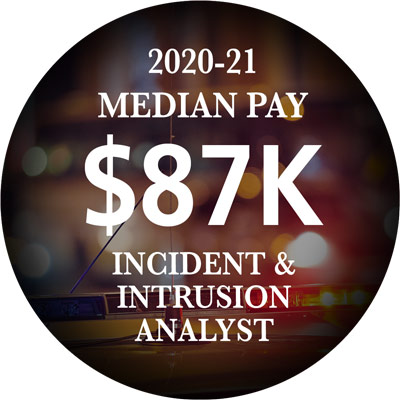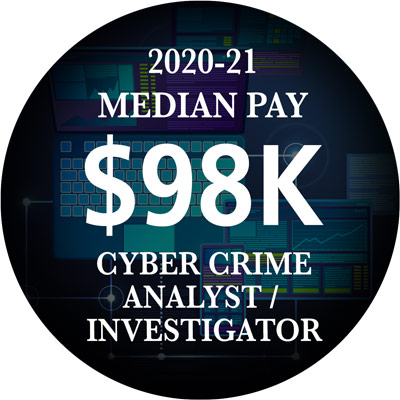Master of Science in Cybercrime

Become a digital crime fighter
Cybercrime is a relatively new and growing area for both civil and criminal investigation. With the outbreak of the COVID-19 pandemic and much of the world's workforce shift to working from home, increased data breaches are at an all-time high. Many cybercriminals have been taking advantage of this by leveraging outdated cybersecurity measures companies have in place.
University of Detroit Mercy’s Master of Science in Cybercrime combines criminal justice studies with aspects of cybersecurity to provide a deeper understanding of digital forensics, cyber defense operations and computer networking for those coming from law enforcement, legal and private sector operational security backgrounds.
This program consists of 10 courses (30 credit hours) and is offered online only. It includes courses focused on criminal investigations, intelligence analysis, terror threats and cyber criminology. These courses prepare students for careers in cybercrime prevention, detection, response and investigation. By combining criminal justice studies with focused aspects of cybersecurity, students will see a complete picture of who commits cybercrimes, what motivates them, as well as how the crime is perpetrated and how cybercriminals can be apprehended.

Contact us for more information
apply.udmercy.edu/register/newinquiry
![]()
Critical Need
According to the FBI’s Internet Crime Complaint Center, complaints of suspected internet crime in 2020 exceeded $4.2 billion, with the top three cybercrimes reported as phishing scams, non-payment/non-delivery scams and extortion. Top monetary losses to cybercrime stem from credential attacks, malware attacks and common vulnerabilities and exposures exploits.
![]()
Program Mission
University of Detroit Mercy's Master of Science in Cybercrime provides relevant and contemporary-based education focused on the criminal aspects of cybercrime for individuals who do not have a technical cybersecurity background.
![]()
Commitment to High Standards
The program is aligned with both the FBI and the U.S. Department of Homeland Security’s national cybersecurity strategies. Curriculum design for this program includes from other national agencies and organizations including the National Security Agency and the U.S. Department of Homeland Security.
Detroit Mercy’s Master of Science in Cybercrime teaches students how to address the spectrum of cybercrime, including the early identification, prevention, response, investigation and prosecution. The program takes traditional law enforcement, criminal investigations and crime prevention strategies and combines them with cybersecurity tools and attack prevention methods that provide knowledge, skills and abilities required to effectively address cyber threats, cybercrime and cyberterrorism challenges.
Curriculum design for this program includes guidance from the National Security Agency (NSA), U.S. Department of Homeland Security (DHS), Center of Academic Excellence in Cyber Defense (CAE-CD), The Commission on Accreditation for Law Enforcement Agencies, Inc. (CALEA), Education for Justice (E4J) Initiative and U.S. Department of Justice (DOJ).
This graduate degree program provides practical hands-on lab assignments using hardware and software for training which students may install on their own personal computer or use as available in Detroit Mercy's Center for Cyber Security & Intelligence Studies computer lab.
Criminal justice and cybercrime are organized under the seventh National Initiative for Cybersecurity Education (NICE) framework category: Investigate. In this category are three types of roles that stand out: Cybersecurity Specialist/Technician, Cyber Crime Analyst/Investigator and Incident Analyst/Responder.

-
Program Structure
Students who enroll full-time can complete the program in two years by taking two courses in the fall and winter terms, and one course during both summer terms. Students can begin the program in the fall or winter terms.
All course work will require students to learn tools of the disciplines and complete all course assignments and projects which will be graded by faculty with the express intent of ensuring high-quality work.
-
MS Program Curriculum
Degree: Master of Science
Major: Cybercrime
Credit Hours: 30University of Detroit Mercy’s Master of Science in Cybercrime combines criminal justice studies with focused aspects of cybersecurity to provide a deeper understanding of digital forensics, cyber defense operations and computer networking for those coming from law enforcement, legal and private sector operational security backgrounds. This fully online 30-credit-hour program can be completed in two years.
The Master of Science in Cybercrime is housed in Detroit Mercy’s Department of Criminal Justice. Instruction is delivered via synchronous and asynchronous courses and may include video lectures and presentations, practice-based exercises and teaching modules. Courses focus on criminal investigations, intelligence analysis, terror threats and cyber criminology to prepare students to professionally and ethically function in the operational areas of cybercrime prevention, detection, response and investigations across all impacted sectors.
-
Application Requirements
Applicants must have a bachelor’s degree from an accredited college or university and must have demonstrated intellectual competence for graduate study. Selection is based on such factors as previous academic record (expected 3.0 GPA) and/or relevant experience. Acceptance on a probationary status is allowed in some cases where academic standards are not fully met but competence has been indicated by the level of the applicant’s professional advancement.
Applicants must submit:
- All transcripts from previous schools
- A statement of purpose
- Three letters of recommendation
- A resume
Note: Applicants do not need to submit GRE scores as part of the application requirements. If scores are submitted they will be reviewed as part of the admission review process.
Apply online at: udmercy.edu/apply.
For questions about your application, contact:
Graduate Admissions
admissions@udmercy.edu
313-993-1245 -
Learning Outcomes
Learning outcomes will be assessed through use of hands-on, experiential learning technical lab assignments, exams, service-learning assignments, individual and group projects, written reports and a comprehensive research project that will require students to demonstrate the cumulative knowledge, skills and abilities learned throughout the program.
Through this program, students will:
- Possess the capacity to evaluate, develop and implement a legally sufficient and technology-based solution(s) to address cybercrime requirements in the context of the disciplinary standards of criminal justice, cybersecurity and digital forensics.
- Have the ability to identify an emerging cybercrime problem, then analyze, develop and implement an appropriate law enforcement response and technological-based solution, focused on prevention, response, mitigation and resolution.
- Demonstrate the ability to apply law enforcement and cybersecurity principles and practices in both the physical and cyberspace environments, while recognizing the human, social and economic impacts of the cybercrime threat.
- Demonstrate the capacity to analyze and evaluate cybercrime threats with respect to developing, implementing and maintaining best operational practices in order to address the presence of risks and threats.
- Develop critical thinking skills, analytic competencies, problem-solving and professional abilities to be proficient in the arena related to prevention, mitigation, enforcement, investigation and prosecution of cybercrime.



